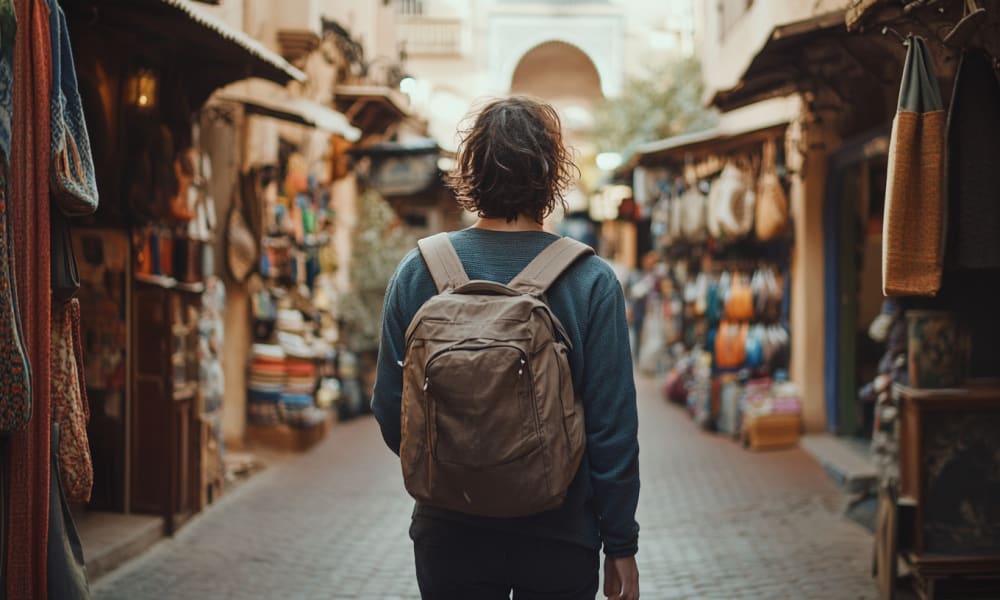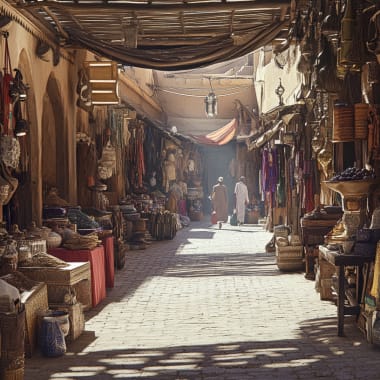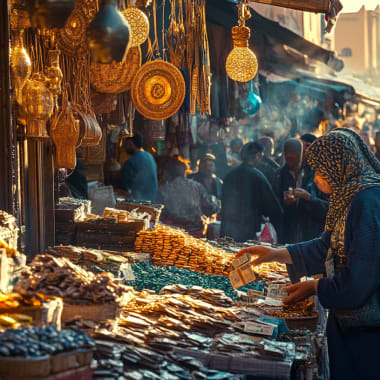
Safety tips for Morocco
Well prepared for individual discovery trips
Well prepared for individual discovery trips
Morocco is considered a safe and fascinating travel destination – especially for independent travelers who wish to explore the country beyond traditional package routes. However, those who travel autonomously should prepare well: The perception of safety not only influences personal travel feelings but also the actual quality of experiences. Proper handling of risks, whether in the alleys of the medinas, on excursions in the Atlas Mountains, or on desert tours, is crucial for a carefree stay.
This article is aimed at independent travelers – including solo adventurers, couples, groups of friends, or families who wish to discover Morocco on their own. Those traveling flexibly through the country, booking their own accommodations, and exploring more remote regions take on more responsibility and need reliable information. This is exactly where our safety tips come in: They help to identify typical challenges, minimize risks, and fully enjoy Morocco's cultural and scenic diversity – with peace of mind.
Safety as an independent traveler in Morocco
Traveling individually in Morocco offers freedom, flexibility, and authentic experiences – but also presents particular challenges. Those who are traveling alone or without organized groups bear more responsibility for their own safety. Especially on popular routes like Marrakech, Fès, the Atlas Mountains, or the Sahara, it is important to prepare well, be aware of potential risks, and act appropriately to the situation. The good news is: With conscious behavior and simple precautions, Morocco can be explored safely and comfortably even as an independent traveler.
General safety level
Morocco is considered a safe travel country with a stable political situation and a pronounced hospitality towards tourists. Violent crime is rare, and terrorist attacks are unlikely due to increased security measures. However, in large cities and tourist centers like Marrakech or Fès, pickpocketing and minor scams occur regularly – especially in bustling souks and public transport.
Remote regions like the Atlas Mountains or the Sahara can also be well traveled but require solid preparation. Conversely, travel to the Western Sahara or border areas near Algeria is expressly discouraged – the security situation there is unstable, and consular support is hardly possible. Those traveling on classic routes can rely on a high level of safety with proper planning.
Special precautions for independent travelers
Independent travelers are more on their own compared to group travelers – and thus also more vulnerable to certain risks. Minor crimes like pickpocketing target particularly solitary or inattentive travelers. Disorientation, such as in the labyrinthine medinas, can quickly lead to unsafe situations. The absence of social control – that is, the security feeling provided by a group – makes individual travelers more susceptible to fraud attempts or unpleasant encounters.
Solo female travelers should pay particular attention to their surroundings and dress modestly to avoid unwanted attention. A self-assured, determined demeanor and declining invitations from strangers are also beneficial. As a general rule: Trekking tours and desert adventures should never be undertaken without registered and experienced guides. Those who plan carefully, stay informed, and respect local customs can also have unforgettable – and safe – travel experiences in Morocco as independent travelers.
Safety tips for Marrakech
Marrakech is a feast for the senses – colorful, vibrant, and full of cultural impressions. However, especially in busy alleys and lively squares like Djemaa el Fna, independent travelers should keep a vigilant eye. The city is generally considered a safe travel destination, but it poses typical challenges such as pickpocketing, overpriced offers, and cultural misunderstandings. Those who prepare and heed a few basic rules can enjoy Marrakech in a relaxed and safe manner.
Protection against pickpocketing
Pickpockets in Marrakech are especially active in crowds – in the souks, markets, or on public transport. To protect yourself, never carry valuables like mobile phones, wallets, or passports in plain sight. Backpacks should be worn in front of the body, and bags should be closed and easily accessible. It’s best to store important documents in the hotel safe and carry only what is necessary. Caution is also advised when withdrawing cash: Use only ATMs located in banks or busy areas and never let strangers “help” you.
Safety in the old town alleys
The Medina of Marrakech is a labyrinth of narrow, winding streets – fascinating, but sometimes challenging. Especially at night, it is advisable to stick to main paths and avoid dark side streets. Use navigation apps to orient yourself better, and avoid being alone. Official taxis or app-based services like Careem provide a safe mode of transportation, especially after dark.
Also, pay attention to your interactions: Be friendly but vigilant towards strangers who offer unsolicited help or seem overly pushy. Always ask for a price quote before availing yourself of services – be it for taxis, guided tours, or shopping. Those who walk through Marrakech with respect, common sense, and clear focus will experience the city safely and with lasting impressions.
Round trips through the Atlas Mountains
The Atlas Mountains are among Morocco's most impressive natural regions – a paradise for hikers, adventurers, and explorers. However, while the landscapes are fascinating, they pose specific challenges for independent travelers: steep paths, extreme temperature fluctuations, and limited infrastructure require careful preparation. Those who wish to travel safely through the mountains should plan their route well, choose the right season, and rely on experienced companionship.
Safe travel in the Atlas Mountains
Well planned is half hiked
Safety begins with route selection: Especially for multi-day trekking tours or off-road routes, having a certified, knowledgeable guide is advisable. They know not only the most reliable paths but also the weather conditions and access to mountain huts. The best travel times are in spring and autumn when the weather is stable and temperatures are pleasant. Those traveling in summer should start tours early in the day to avoid heat – while in winter, snow and ice are common at higher altitudes and require special equipment and alpine experience.
Risks and precautions
Caution protects at remote heights
The terrain in the Atlas Mountains can be demanding: steep, rocky passages, poorly marked paths, and limited mobile reception are common. Therefore, the rules are: Never hike alone, always stay on marked trails, and carry enough water, weatherproof clothing, and sun protection. Always inform someone of your route and planned return time – especially in less developed regions. Altitude sickness should not be underestimated: Pay attention to physical signals and adjust your ascent accordingly. Those who prepare, behave locally, and know the risks can safely and intensively experience the beauty of the Atlas Mountains.
Preparation for safe desert tours
The Moroccan desert is one of the most impressive landscapes in the country – with golden dunes, vast silence, and an incomparable feeling of freedom. However, as captivating as this adventure is, thorough preparation is essential to minimize risks and ensure a safe enjoyment of the tour. Those who plan well and are properly equipped lay the best foundation for an unforgettable yet safe experience.
Planning and preparation
A safe desert tour begins with selecting an experienced, registered provider. Especially in remote areas, local knowledge and organization are essential. Never travel alone and especially avoid the border region to Algeria and the Western Sahara – there is a heightened security risk in those areas. Before starting, check with local authorities or your hotel about the current situation.
Standard gear includes sunscreen, a head covering, long airy clothing for daytime, warm clothing for nighttime, and your own sleeping bag. A first aid kit, adequate drinking water, a charged mobile phone with a local SIM card, and a GPS device or an offline map are also essential. Physical fitness is also important: hikes through the dunes or camel rides can be strenuous. Those who acclimate to heat early and train endurance and strength are well equipped.
Staying safe during the tour
Also on the way, safety takes precedence. Always stay with the guide, stick to the route, and avoid spontaneous detours on your own. Always carry emergency contacts and copies of important documents with you. Since mobile coverage may be limited, a charged phone with emergency numbers (e.g., 141 for medical assistance or 177 for the gendarmerie in rural areas) is especially important.
Weather changes such as sandstorms are not uncommon in the desert. Seek shelter immediately at signs of a storm, cover your mouth and eyes, and wait for the storm to pass. Also, be cautious of animals like scorpions or snakes – do not touch anything and inform your guide if in doubt. If you get lost, stay in a visible spot and avoid continuing alone. With caution, preparation, and calmness, you can handle extreme conditions – and experience the magic of the desert safely and intensely.
Traveling in border regions and using public transportation: Think safety consciously
Morocco can be excellently traveled independently – whether by bus, train, or on remote routes through desert and mountains. However, those venturing off the classic tourist paths should inform themselves well in advance: While many regions of the country are considered safe, there are also areas where increased caution is advised. This particularly concerns certain border regions in the south and east as well as certain aspects of public infrastructure. Knowing these specifics and following a few basic rules can make even these stages of the journey relaxed and safe.
Special safety risks in border regions
While Morocco is considered a safe travel country on common tourist routes, traveling in certain border areas requires increased caution. Particularly, stays in the Western Sahara and in the border region with Algeria are explicitly discouraged. These areas are regarded as unstable, with a heightened risk of abductions, terrorist activities, and the presence of uncleared mines. The area between the Moroccan border wall and the Western Sahara is also a militarily secured restricted area – consular assistance is not possible there.
However, visiting popular southern destinations like the Draa Valley near Zagora or the desert towns of Erfoud and Merzouga can be done without worry – provided you stick to paved roads and are accompanied by local guides. Off-road tours and hikes in remote regions should only be done in groups and with experienced, registered guides. This way, the adventure remains safe and authentic at the same time.
Using public transport
Morocco's public transport network is well developed and a reliable option for independent travelers – especially on the main connections between cities. Long-distance buses from reputable providers like Supratours or CTM offer modern comfort and a high level of safety. City buses, on the other hand, are often crowded and provide opportunities for pickpockets – they are therefore only partially recommended for travelers.
The train network is also convincing: Especially the high-speed train Al-Boraq on the Tangier–Casablanca route offers a comfortable and fast journey. Whether by bus or train – always keep an eye on your luggage, book tickets preferably in advance, and avoid night travel if possible.
Taxis are a flexible means of transport – both Grand taxis for long-distance travel and Petit taxis for local trips. Important: Clarify the price or meter before starting the ride and, if possible, share the route with a trusted person. Those who remain vigilant and follow these simple rules can discover Morocco safely and stress-free using public transport.
Trustworthy bookings and potential danger signs
Individual travels through Morocco offer a wealth of unforgettable experiences – provided you make the right decisions when selecting accommodations and tour providers. Because even though the country can be safely traveled in many parts, there are some pitfalls in booking that can significantly affect your travel quality. However, with a little preparation and attention to detail, many risks can be avoided.
Trustworthy tours and guides
Whether city tours in Marrakech, trekking in the Atlas Mountains, or desert tours near Merzouga – for guided experiences, you should always rely on licensed providers. Check for a valid operating permit, transparent communication, and good accessibility in advance. Review platforms like Google, Trustpilot, or independent travel blogs are valuable sources for checking other travelers' experiences. A high number of current positive reviews usually indicates professionalism and safety.
Reliable accommodations and providers are characterized by detailed descriptions, transparent prices, and clear cancellation policies. International certifications (e.g., from Booking.com) can be an additional quality feature – especially for hotels or riads. For tours in remote areas like the Atlas Mountains or the desert, it is advisable to travel in groups with local guides who possess emergency equipment and first aid knowledge.
Warning signs for unsafe situations
Be vigilant about offers that sound too good to be true. If contact information is missing, the description is vague, or the communication pressures immediate booking, you should be skeptical. Also, extremely low prices compared to the market are a warning sign – often they hide unprofessional or fraudulent providers. Avoid payments to private accounts and prefer established, secure payment methods.
In Moroccan cities – especially in tourist centers – self-proclaimed 'guides' sometimes appear who offer unsolicited help. Even if they seem friendly, they often expect payment or try to lead you to certain shops. Do not let yourself be pressured, and insist on clear agreements in advance. Those who know the typical warning signs can make their trip more relaxed and safer.
Discover the Orient with experts who have explored every corner themselves
Your dream holiday, tailor-made by experts.
We don't just know the Middle East from books, we visit the country several times a year to experience the culture, landscape and people first-hand.
From your first enquiry to your return home, we are there for you personally - by phone, email or WhatsApp, whenever you need us. Our trips are as unique as you are: individually planned and provided with exclusive privileges and high-quality arrangements that will make your trip unforgettable.
Experts for your Orient trip







